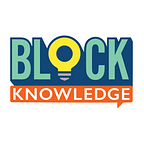Changing A Community Block by Block
According to a 2019 study by RateMyInvestor and Diversity VC, 77.1% of VC backed founders across the United States are White. By comparison, only 1% of VC backed founders identify as black and only 1.8% identify as Latinx. In terms of gender, only 9% of funded founders are women. These statistics highlight the enormous disparity in access to venture capital for underestimated founders, including racial/ethnic minorities, women, and other underserved populations in our communities.
Block Knowledge, a Kansas City based non-profit serving and uplifting the underestimated tech founder, came into existence due in part to these statistics. When Block Knowledge founder and CEO, Quest Moffat, kept seeing the same statistics and low percentages over and over again in regard to female founders and founders of color, he knew something had to be done.
“Being a black founder myself, I read all of these articles citing the low statistics around how much VC funding was distributed in minority communities.” Quest says, “It was disturbing to me.”
Across Kansas City, there are a number of organizations and collectives dedicated to enhancing and empowering the entrepreneurial spirit in folks across the metropolitan area. However, when looked at through an equity and inclusion lens, these organizations serve a very small portion of the population.
“I know a lot of these leaders, and I know these low diversity numbers aren’t intentional, but when I went into communities of color and asked founders from these communities if they knew about the resources offered by various organizations, a majority had never heard about them before”, says Quest.
The goal of Block Knowledge is to rebuild the “block”, that block being the communities that have for years been forgotten by the mainstream entrepreneurial community. Their goal isn’t to just help these communities find success, but to find comfort with failure, and have the resources and sense of community in place to catch them when those failures come. According to Quest, failure and the ability to fail is a necessary part of the entrepreneurial ecosystem.
Failure needs to happen, and it does suck, but it makes a person more robust. My philosophy is that failure comes in various levels, and if you break it down, failure is: 10% natural factors, 10% external factors that are out of your control, and only 80% you and your situation.
Therefore, the goal isn’t to eliminate failure entirely, but to de-risk your own potential to fail: have mentors to support you along the way, have a network and sense of community to vent to or rely on when things are going wrong, have access to resources such as education and training to help you learn what you don’t know. Unfortunately, these methods of de-risking are commonly not readily available for underestimated founders. This is where Block Knowledge comes in.
With a team of knowledgeable individuals available to provide support, workshops and trainings to help founders bridge the gaps in their own knowledge, and a strong network of mentors, partnerships, and community members, Block Knowledge provides access and opportunity to underestimated founders who may not know where to begin.
Block Knowledge isn’t necessarily looking for the typical founder. In Quest’s words, Block Knowledge looks to serve the “displaced individual”. Someone who has experienced failure before and is wanting to try again. Someone who has put their tech dreams on the back burner while they worked a full-time job to make ends meet. Someone with high potential that simply hasn’t had the opportunity to take the plunge on their idea.
Block Knowledge’s biggest goal right now is to create a sense of community across the Kansas City ecosystem, by building partnerships and relationships with other organizations serving entrepreneurs from different avenues. While Block Knowledge primarily serves founders in the tech industry, their network allows the organization to connect founders in other industries with the needed resources, such as local organizations supporting brick and mortar or restaurant entrepreneurs.
While there is a long road ahead of them, Block Knowledge hopes to contribute to changing the statistics facing underestimated female founders and founders of color. And they plan to do it block by block.
